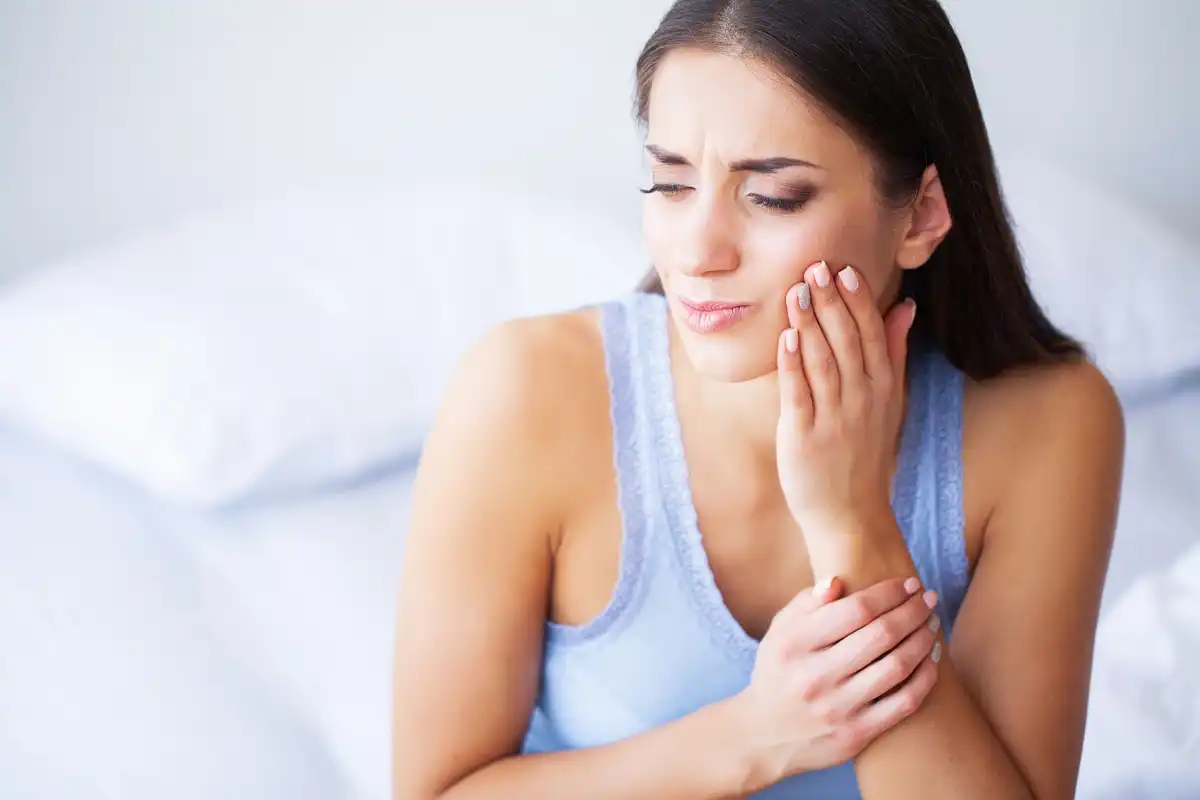Teeth Sensitivity After A Dental Cleaning? Causes and Relief


Some people love getting their teeth cleaned, while others experience teeth sensitivity after cleaning appointments. If you’re one of the people who have tender gums, sensitivity, or teeth pain after your six-month cleaning visits, you’re not alone! Knowing what’s normal, what isn’t, and what you can do to help your symptoms the next time you’re getting your teeth cleaned is important when you’re planning to see your hygienist (Because the last thing you want to do is delay your checkups and then develop gum disease or tooth decay.)
Why Do They Hurt After Cleaning?
Typically, teeth sensitivity after cleaning visits doesn’t last very long. At the most, it might be a few days. There are a couple of reasons why: Your gums may be irritated, or your tooth is sensitive because it was covered by tartar and isn’t anymore.
For starters, sensitive gums after checkups are usually due to the cleaning and examination process. If you have healthy gums, there’s minimal irritation. But if you have gingivitis or symptoms of gum disease – such as swelling and bleeding – your gums will be more tender to the touch. Cleaning around them to remove plaque, tartar, and stain can leave you with gum and teeth sensitivity after cleaning visits.

Common Causes Of Tooth Sensitivity
What other issues can cause sensitivity? When your teeth are sore after cleaning appointments you may be inclined to think it was something that your hygienist or dentist did. But what about irritation and tenderness that isn’t associated with the reasons we listed above? Here are other common causes of sensitive teeth:
1) Whitening Products
Bleaching your teeth naturally removes stain particles inside of those tubules we talked about. For some people, the whitening process can make their teeth sensitive (especially if the product isn’t the best one for your teeth.)
2) Changes In Temperature
Dental exams are most effective when your teeth are completely dry. That’s why your dentist and hygienist frequently blow air on certain surfaces to see better. Depending on how sensitive your teeth usually are, this process could make your teeth tender once the air hits them.
3) Tooth Decay
Cavities in teeth can cause different types of teeth sensitivity, particularly too cold, heat, and sweets. If you’re having your teeth cleaned and examined, there could be small areas of tooth decay that feel tender afterwards.
4) Leaky Fillings
As older dental work starts to age, you can develop “leaky margins” around the edges of the restoration. When you’re eating, drinking, or even getting your teeth cleaned, you might experience heightened tooth sensitivity as the time draws closer to have your filling changed out.
5) Gum Recession
Sensitivity From A Deep Cleaning
Most people don’t get teeth pain after cleanings with their hygienist. But that’s not always the case if you need a deep cleaning – aka scaling and root planing – for gum disease. Since deep cleanings usually involve local anesthetic, heavy tartar removal, and even reaching way down under your gums to treat diseased areas, soreness and teeth pain after cleaning visits is fairly common.
The good news is that soreness is temporary. Since deep cleanings are an essential part of the treatment and recovery of gum disease, your dental team can take steps to make this process as gentle as possible. However, it’s natural to have tenderness where the anesthetic was injected, or for exposed root surfaces to temporarily hurt now that there’s no tartar covering them up.
Proper Care After A Dental Cleaning
Related: Best Electric Toothbrushes for Sensitive Teeth and Gums
Then, floss at least once a day, reaching just under the gums to disrupt soft plaque before it hardens into tartar. For me, I personally like to use a water flosser every day to clean under the edges of my gums and between teeth. If you have sensitive teeth, I recommend putting warmer water in your flosser reservoir than normal.
Relief At Home
When your teeth are sore after cleaning appointments, try to avoid cold foods or drinks for the next few days. Drinking through a straw can help, too. In the meantime, it might help to rinse with warm saltwater (if it’s your gums that are sore) and take an over-the-counter pain reliever such as Motrin or Tylenol.
If for any reason your teeth are sore after cleaning and the pain becomes worse over the next few days, you’ll need to speak to your dentist. It could be that you have an area of demineralized enamel (the earliest sign of tooth decay) or another issue that needs attention.
Preventing Tooth Sensitivity
Here’s the great news: if you tend to get teeth sensitivity after cleanings, there are steps you can take to prevent it from happening over and over.
Tooth sensitivity is a preventative condition that – with daily steps – can usually be treated at home. Here’s how:
Use Fluoride Daily
Get a fluoride rinse or prescription fluoride gel from your dentist’s office and use it as directed. If you have extremely hypersensitive teeth, ask your dentist about a fluoride varnish every 3-4 months (or as needed.) Most people say that having an in-office treatment helps for several months at a time, preventing teeth sensitivity after cleaning appointments.
Switch To A Sensitivity Toothpaste
Trade your whitening toothpaste out for one that’s formulated for sensitive teeth. These blends help to block the tubules (there’s that word again) where the nerves in your teeth pick up on temperature changes.
Sensitivity toothpaste puts minerals back into your enamel to keep those tubules sealed off. But it only works if you use it every day. If you’re expecting teeth sensitivity after cleaning visits, start using the toothpaste for sensitive teeth at least two weeks beforehand.
Sensitive After A Cleaning Recap
Some people experience sensitive teeth after cleanings more than others. If you have exposed root surfaces, existing gum disease, have heavy tartar buildup, or use whitening toothpaste, you’re probably more at risk. Talk to your dentist about different sensitivity and fluoride products. Don’t ignore the symptoms; it could be that you have a new cavity or leaky filling that needs attention before it gets much worse.

Make your inbox smile!
Subscribe






